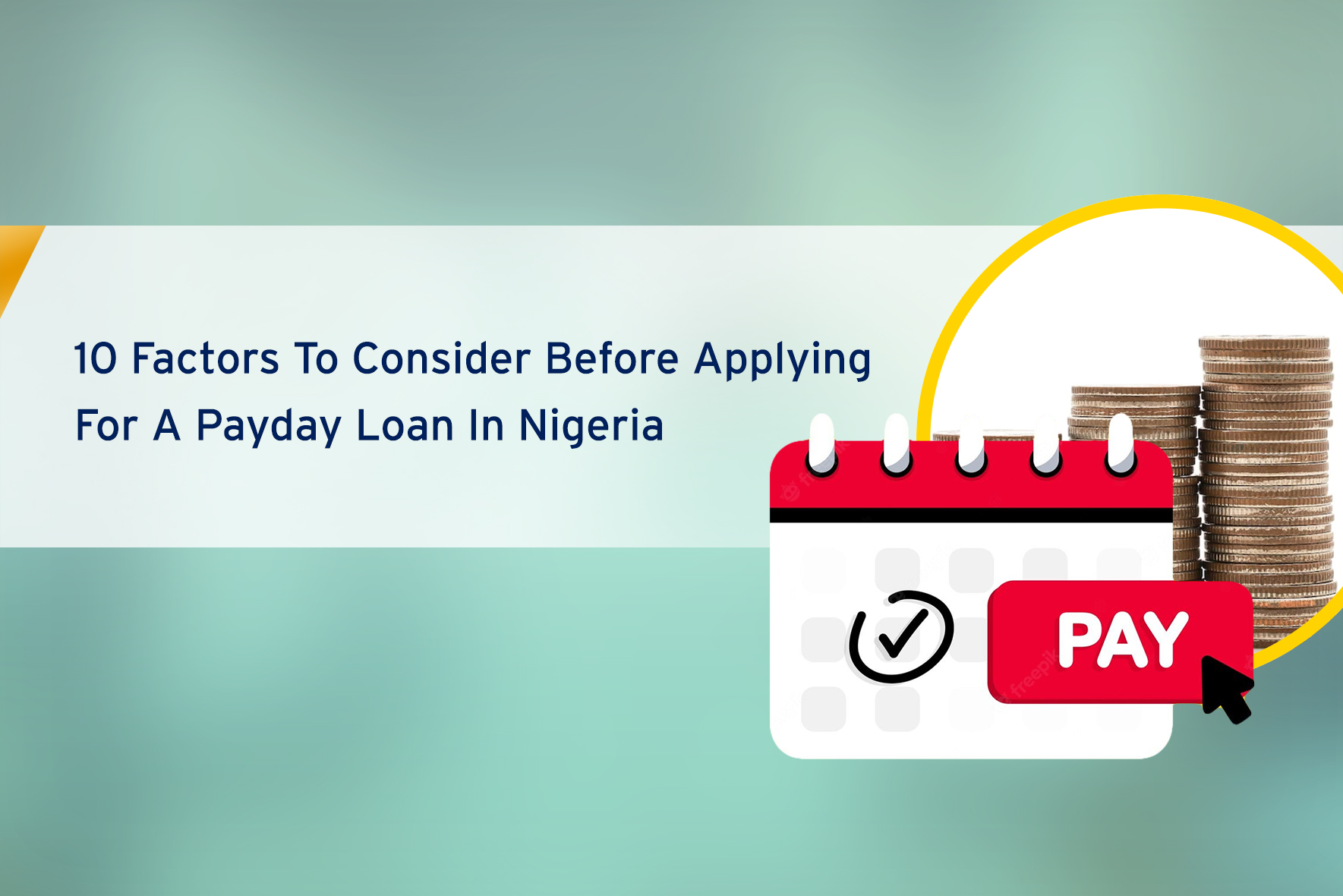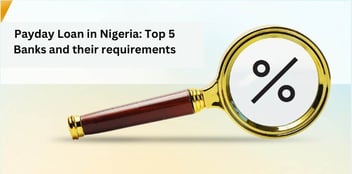
10 Factors to consider before applying for a payday loan in Nigeria
Author Eyitemi Efole
Until recently, applying for a payday loan in Nigeria used to be a daunting task. From lengthy paperwork to getting collateral or a guarantor, the process usually took days or sometimes weeks.
However, with advancements in technology, borrowers can now access loans with the push of a few buttons. While the ease with which loans are accessed may seem like a plus for the financial market, is it really all peaches and roses?
What are Payday Loans?
Payday loans are short-term, unsecured loans also known as cash advances or salary advances. They are made available in small amounts to individuals in need, for a short period of time.
The entire amount of the loan, along with a lender’s fee, will be charged to the customer and this loan will need to be repaid with the customer’s next salary.
Payday loans are designed to solve a borrower’s urgent financial need one time before receiving his next paycheck, as part of a short-term loan.
Payday loans in Nigeria usually come in small and sometimes large amounts. Borrowers can access as little as ₦2,000 to as much as ₦5 million as advertised by most payday lenders in Nigeria.
How do Payday Loans work?
Payday loans are mostly provided by financial institutions based on the borrowers’ eligibility criteria. There are lenders who grant loans without performing a credit check on the borrower as part of the loan application process.
In order to be eligible for a short-term loan of this kind, the borrower is required to grant a third party, in this case, the lender, access to their account for automatic deductions.
The other option would be to write a postdated cheque, which includes the entire amount of the loan principal plus the creditor’s fee. However, this system is no longer popular. The lender has the right to redeem the cheque on the following pay date.
Applying for a payday loan
In the modern age, the process of applying for a payday loan through the online portal of the financial lender’s website has become comparatively easier. This is a result of the advancement of technology.
On the online application form, you need to provide a few relevant details like your bank account number, your employment information, and maybe some contact information about your friends and family, and within a day, you will be able to apply for a cash advance.
If you fail to repay the loan amount by the next due date, the lender will use the details of your spouse and family members as collateral.
This is in the event that you are not able to pay back the loan amount. Once the loan amount is approved, it will be credited to your account within 24 hours.
Requirements for a payday loan
To be eligible for a payday loan, an individual does not have to be employed in order to apply for one. The only qualification is that he should have a steady source of income that he can use to meet his repayment obligations by the due date of the loan.
In some cases, the borrower is required to be at least 18 years of age. Also, a poor credit score does not prevent you from getting a payday loan.
The borrower is also required to disclose to the lender the details of his bank account for repayment purposes. He or she must have an active bank account.
Also required from the borrower is a government-issued photo ID, proof of employment, salary slips or proof of income for business owners, and proof of residence.
Factors to consider before applying for a payday loan
Before jumping into your loan application, head first, there are factors you need to consider. These factors, listed below, will guide you through the loan application process, giving you the best experience.
-
How much do you need to borrow
Knowing how much you will be needing is the first step to getting the best out of your loan application. Having this information in mind will point you in the right direction.
nairaCompare’s loan calculator can help you in this regard.
-
Research different lenders
Before applying for a payday loan, make sure you know and understand how the lender operates. To get the best loan offer, it is best to research different lenders. Click on payday loans to compare regulated lenders on nairaCompare.
-
How much can you afford?
Now that you know how much you want to borrow, you should now understand how much you can afford to pay back each month.
When you understand how much you can afford to pay back each month, you are best able to make the right decision on how long you need to take the loan out.
The lower repayments mean that you would not struggle to meet your other commitments. Bear in mind though that the longer the loan, the more you will pay in interest.
-
Terms and condition
Every loan comes with its terms and conditions. The fine print, or the terms and conditions, is part of a legally binding agreement between a borrower and a lender.
The purpose of a loan agreement is to protect the borrower and the lender when money is borrowed. These agreements break down the minute details of the transaction including the interest rate, the loan amount, and any relevant terms including the repayment period so that the lender is reassured that they will get their money back.
-
Fees and other charges
Yes, like other loans, payday loans in Nigeria have fees. Some of the fees or charges associated with this might include origination fees, prepayment penalties for those who pay off their loans earlier than scheduled, late payment fees, and a host of others.
Expectedly, payday loans also come with interest rates, depending on the amount being borrowed or the credit rating of the borrower.
The late fees and prepayment fees can be avoided as long as you follow the terms and conditions of the loan. Make sure you can make the payments on time to avoid penalty fees.
Also, remember that missing a payment can have serious consequences.
-
Repayment strategy
Before deciding on the loan amount, figure out the maximum you can afford to pay every month without breaking a sweat.
In deciding your repayment strategies, you will need to factor in how much you need to pay for necessities such as utilities, food, and other sundry expenses.
This will help you decide how much you can put into debt servicing, which will in turn determine how much you can borrow.
-
Interest rates
Interest rates for loans in Nigeria vary and are a strong factor in settling for a loan offer. Payday loans are known to have some of the highest interest rates largely because they are unsecured kinds of loans. That means, they can be obtained without collateral.
If you are a borrower, rising interest rates will usually mean that you will pay more for borrowing money, and conversely, lower interest rates will usually mean you will pay less. How much of an impact will all depend on whether your borrowing is tied more to short-term rates or longer-term rates.
-
Credit score and history
What does your credit history look like? Before applying for a payday loan in Nigeria, make sure you have an idea of what your credit score is like.
A borrower’s credit score is one of the most important factors a lender considers when evaluating a loan application. Credit scores range from 300 to 850 and are based on factors like payment history, amount of outstanding debt and length of credit history.
Many lenders require applicants to have a minimum score of around 600 to qualify, but some lenders will lend to applicants without any credit history at all. The downside to this is that the borrower will be paying higher interest rates.
-
Purpose of a loan
Understanding the purpose of the loan will help you decide whether to go ahead with applying for one. While we cannot control when urgent financial needs arise, some borrowers are known to obtain loans for frivolous reasons.
This is a dangerous trend as it has the tendency of pushing one into an unnecessary debt cycle.
Payday loans have high-interest rates and if you default on a payment, it could be that paying it all back becomes a lot more expensive than you intended it to be.
-
Borrow from a regulated credit provider
Lastly, and probably the most important, make sure to patronise only a regulated lender. Recently, the Central Bank of Nigeria, CBN, had to clamp down on some loan providers because of their highhanded practices.
Patronising government-accredited loan providers give the borrower peace of mind and ensure that they don’t fall victim to a loan scam.
About Author

Eyitemi Efole
Eyitemi Efole is exploring the marketing field, with a particular interest in brand management, strategy, and operations. She is keen on understanding how brands build trust and connect meaningfully with their audience.









